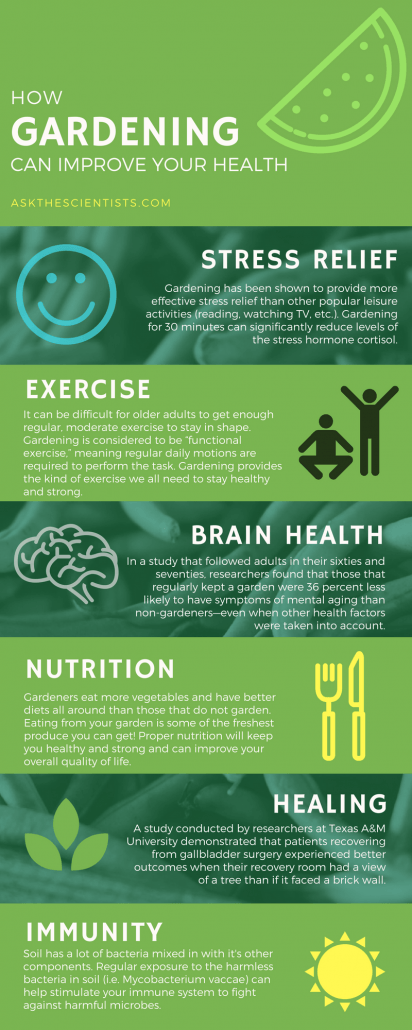To garden for health, choose nutritious plants and incorporate physical activity into your gardening routine. Gardening can improve mental and physical well-being, provide fresh and organic produce, and help reduce stress levels.
Gardening is not only a pleasant hobby but also a great way to improve your physical and mental health. By growing your own nutritious fruits, vegetables, and herbs, you can ensure a constant supply of fresh and organic produce. Additionally, gardening offers an opportunity to engage in physical activity and enjoy the outdoors, which can contribute to improved overall fitness levels.
Moreover, the act of gardening itself has been shown to have therapeutic and stress-reducing effects, promoting mental well-being. Whether you have a spacious backyard or limited space on a balcony, gardening can be adapted to fit any living situation. So, roll up your sleeves, get your hands dirty, and start reaping the many health benefits of gardening.

Credit: healthtalk.unchealthcare.org
Choosing The Right Plants
Understanding the climate in your area is crucial for successful gardening. Research what plants thrive in your region and choose those species that can withstand the specific weather conditions. Consider factors such as temperature, rainfall, and sunlight exposure to determine the most suitable plants for your garden. Additionally, selecting disease-resistant varieties can help prevent common garden ailments. Look for plants that are resistant to pests and diseases prevalent in your area. This will ensure that your plants stay healthy and productive, reducing the need for harsh chemicals and pesticides. By carefully choosing the right plants for your climate and selecting disease-resistant varieties, you can create a healthy garden environment that promotes plant growth and minimizes the risk of diseases and pests.
Creating A Healthy Garden Environment
Preparing the Soil: Before planting, it's essential to prepare the soil to ensure optimal nutrition for your plants. Start by removing any weeds or debris, then dig the soil to loosen it and improve drainage. Incorporate organic matter such as compost or aged manure to boost fertility and promote healthy root development.
Using Organic Fertilizers: Avoid synthetic fertilizers that can harm the environment and opt for organic alternatives. Organic fertilizers, such as compost or fish emulsion, provide a slow release of nutrients, promoting long-term soil health. Spread the fertilizer evenly across the garden, avoiding direct contact with plant stems or leaves.
Implementing Integrated Pest Management: Rather than relying solely on chemical pesticides, adopt an integrated pest management approach. Encourage beneficial insects and birds by planting flowers that attract them. Use natural pest repellents like neem oil or garlic spray, and regularly inspect plants for signs of pests to take prompt action.
Benefits Of Gardening For Health
Gardening is not only a rewarding hobby but also beneficial for your overall health and well-being. Physically, gardening engages your entire body and contributes to increased physical activity levels. From digging and planting to watering and weeding, these movements improve muscle strength, flexibility, and endurance. Gardening also promotes heart health by reducing the risk of cardiovascular diseases and improving blood circulation.
Mentally, spending time in the garden can be a great stress reliever, boosting mental clarity, and promoting relaxation. It serves as a form of therapy and can help reduce anxiety and depression symptoms. Furthermore, being outdoors surrounded by nature promotes a sense of wellness and calm.
Environmentally, gardening has numerous benefits. By creating green spaces, you are actively contributing to the well-being of the environment. Gardens provide habitat for pollinators and wildlife, improve air quality, and enhance biodiversity.
So, start cultivating your garden and enjoy the physical, mental, and environmental health benefits it offers!

Credit: www.foodnetwork.com

Credit: askthescientists.com
Frequently Asked Questions Of How To Garden For Health
How Can Gardening Improve My Health?
Gardening can improve your health in multiple ways. It gets you moving, burning calories, and promoting physical fitness. Additionally, gardening exposes you to sunlight, allowing your body to absorb Vitamin D. It also reduces stress, improves mental health, and provides a sense of accomplishment and satisfaction.
What Are The Best Plants To Grow For Health Benefits?
Several plants offer great health benefits when grown in your garden. Some popular choices include leafy greens like spinach and kale, which are packed with nutrients. Herbs like basil and mint have antioxidant properties. Berries like strawberries and blueberries are rich in vitamins and antioxidants.
Additionally, growing aloe vera and lavender can have soothing effects on the body.
Can Gardening Help Reduce Food Costs?
Absolutely! Growing your own food can significantly reduce your grocery bills. By investing time and effort into your garden, you can produce a variety of vegetables, fruits, and herbs that would otherwise be expensive to buy. Additionally, gardening allows you to have control over the cultivation practices, ensuring you grow organic and pesticide-free produce.
Conclusion
Gardening offers numerous health benefits that can improve our physical and mental well-being. Whether it's engaging in physical activity, connecting with nature, or cultivating fresh produce, this fulfilling hobby promotes a healthier lifestyle. By incorporating gardening into our daily routine, we can enhance our overall health and quality of life.
So, roll up your sleeves, grab those gardening tools, and enjoy the therapeutic and healthful benefits of this timeless activity. Happy gardening!
Comments
Post a Comment